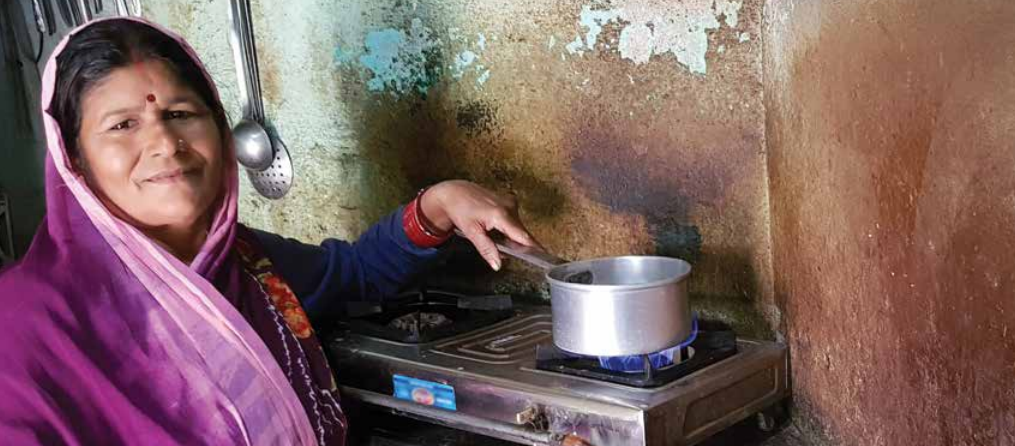 Workers maintain a thermal power station, Takoradi, Ghana / Jonathan Ernst/World Bank
Workers maintain a thermal power station, Takoradi, Ghana / Jonathan Ernst/World Bank
Clean cooking – cooking with cleaner fuels and energy-efficient modern stoves instead of traditional biomass or polluting fuels - is often identified as one of the most cost-effective measures to reduce carbon emissions. Approx. 1 gigaton of carbon dioxide equivalent is produced every year from burning wood fuels, equal to 1.9- 2.3% of global emissions, according to the Clean Cooking Alliance.
Clean Cooking also has important benefits for public health, the empowerment of women, and the protection of forests. Nearly 70 countries have so far included household energy or clean cooking–related goals in their Nationally Determined Contributions (NDCs).
Today, according to the 2022 Tracking SDG7 report, 2.4 billion people globally still cook with polluting, traditional fuels and technologies. Estimates show that a U$25 billion annual investment is needed to achieve universal access to clean cooking. But annual commitments to clean cooking, according to SEforAll, stand at around USD 130 million – showing a huge financing gap.
So how do we finance clean cooking to scale?
What is the opportunity?
Carbon finance is essentially a results-based financing (RBF) mechanism that links payment to verified CO2 emission reductions.
For clean cookstove suppliers, carbon finance creates a guaranteed source of revenue once a stove is delivered, and its climate impact is verified. Guaranteed capital is particularly important for developing modern cooking solutions that require large upfront investments in setting up production facilities and distribution networks.
For governments, carbon finance is an opportunity to receive support in their efforts to protect the health of millions of women and children and to fight deforestation by shifting away from wood and other biomass for cooking.
And for donors, carbon finance is a way to showcase in a very concrete way the result of their clean cooking programs. Progress in clean cooking contributes to several Sustainable Development Goals, including on energy, health, gender and climate.
With the recent surge in carbon prices, more carbon finance is finding its way to the clean cooking sector. Historically, even when the price of carbon was less than US$10 per ton of carbon dioxide equivalent (tCO2e), carbon finance was an attractive source of financing for cookstove projects, either through the compliance market, such as the Clean Development Mechanism (CDM), or the voluntary carbon market (VCM). As more corporations have announced their carbon neutrality goals, the VCM has skyrocketed in value to US$2 billion in 2021, a sixfold increase in just two years. The recent rise in carbon prices—sometimes in the range of US$15–25 per tCO2e for clean cooking projects—is attracting an increasing number of project developers and impact financiers to the sector. The question is how to harness this opportunity while managing the downside risks.
What are the risks?
The carbon market is still evolving, and the current ambiguous environment has three major risks:
- Integrity. There could be double counting between offsets claimed by carbon finance project developers and by governments as part of their NDCs.
- Reputational. Carbon finance project developers could promote cookstoves that only bring marginal improvements – with little reduction in emissions or health improvement – and still obtain carbon credits.
- Regulatory. There is no unified international regulation on the quality of carbon credits that can be used in the VCM and how they interact with the compliance markets.
In addition, the current regulatory uncertainty and higher carbon prices have encouraged some companies to adopt a free-distribution business model that relies fully on carbon revenue. But both economic theory and evidence confirm that free stove distribution negatively impacts the market. It removes consumer choice, squeezes out local producers, and limits product innovation.
Balancing opportunity and risk: Harnessing carbon markets to better meet local needs
It sounds complicated and it is. This is why, in a country like Rwanda, the government and the World Bank are working hand in hand to make it simple for cook stove producers and distributors to access carbon finance. In 2020, the Bank launched the Rwanda Energy Access and Quality Improvement Project (EAQIP). The project includes the World Bank’s largest clean cooking operation in Africa, and the first project co-financed by the Clean Cooking Fund (CCF), hosted by the Energy Sector Management Assistance Program (ESMAP).
The clean cooking operation functions in the following way to access carbon finance:
- The government of Rwanda created a Pro-Poor Fund, which is managed by the Development Bank of Rwanda. With Clean Cooking Fund co-financing, EAQIP provided initial capital in that fund.
- Clean cookstove companies are invited to apply for grant financing from the Pro-Poor Fund. The Fund is results-based, which means that to obtain grant, companies must show proof of sale of eligible clean cookstoves to eligible households. The Fund will disburse grant payments to companies upon verified sales and usage of those clean cookstoves.
- Meanwhile, the World Bank’s Carbon Initiative for Development (Ci-Dev) commits to paying the Government of Rwanda for the emissions reductions generated by the cookstoves. In effect, this means that the government receives carbon credits, not the cookstove companies, which saves them from having to participate in this rather complex scheme.
- Then, from the carbon revenue generated, the Government of Rwanda replenishes the Pro-Poor Fund.
What was put in place in Rwanda is replicable in other countries.
What we recommend
Moving forward, we suggest the following actions:
Mitigating Carbon Finance Risks – RecommendationsFor governments
For carbon-credit certification agencies
For development partners
For international carbon-market companies
|
The authors gratefully acknowledge the review comments received from Matthew King, Martina Bosi, Dan Radack, Sameer Shukla, and Zijun Li.
Subscribe here to stay up to date with the latest Energy blogs.
Related:



Join the Conversation